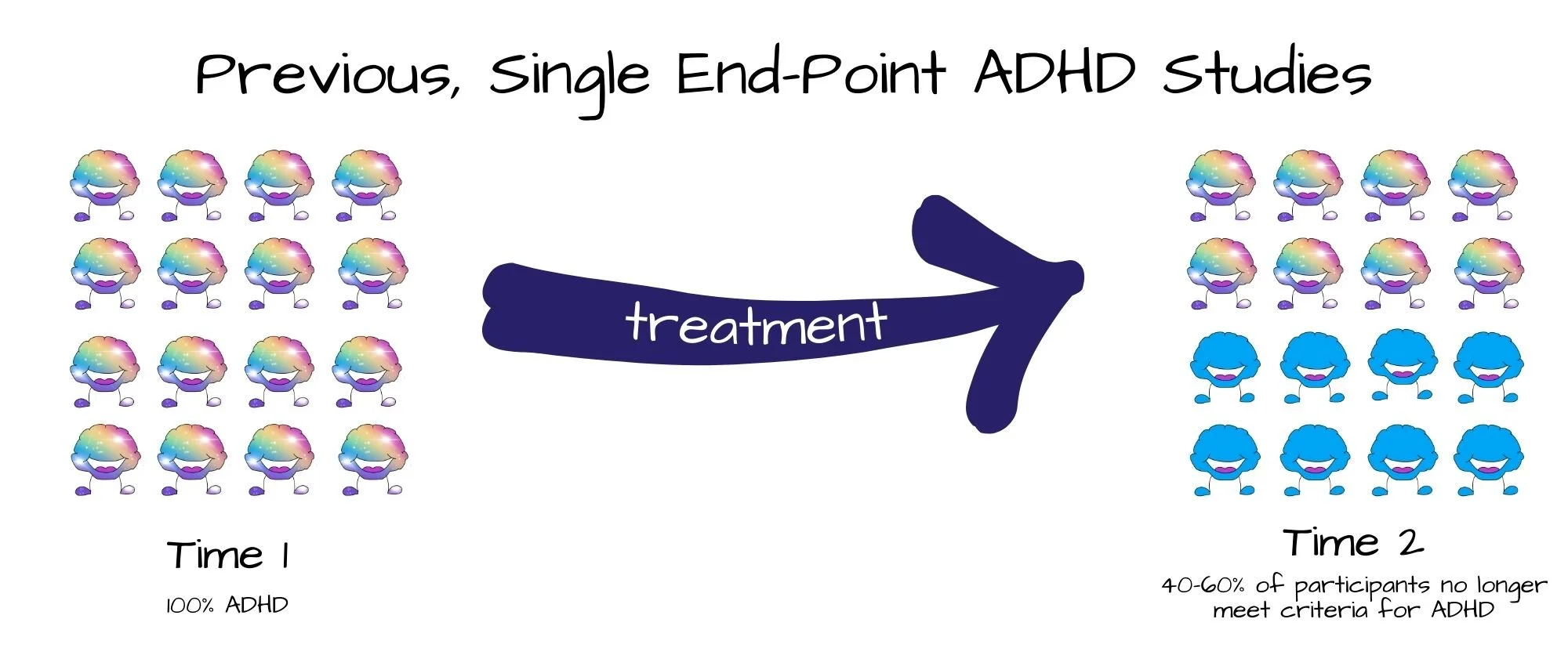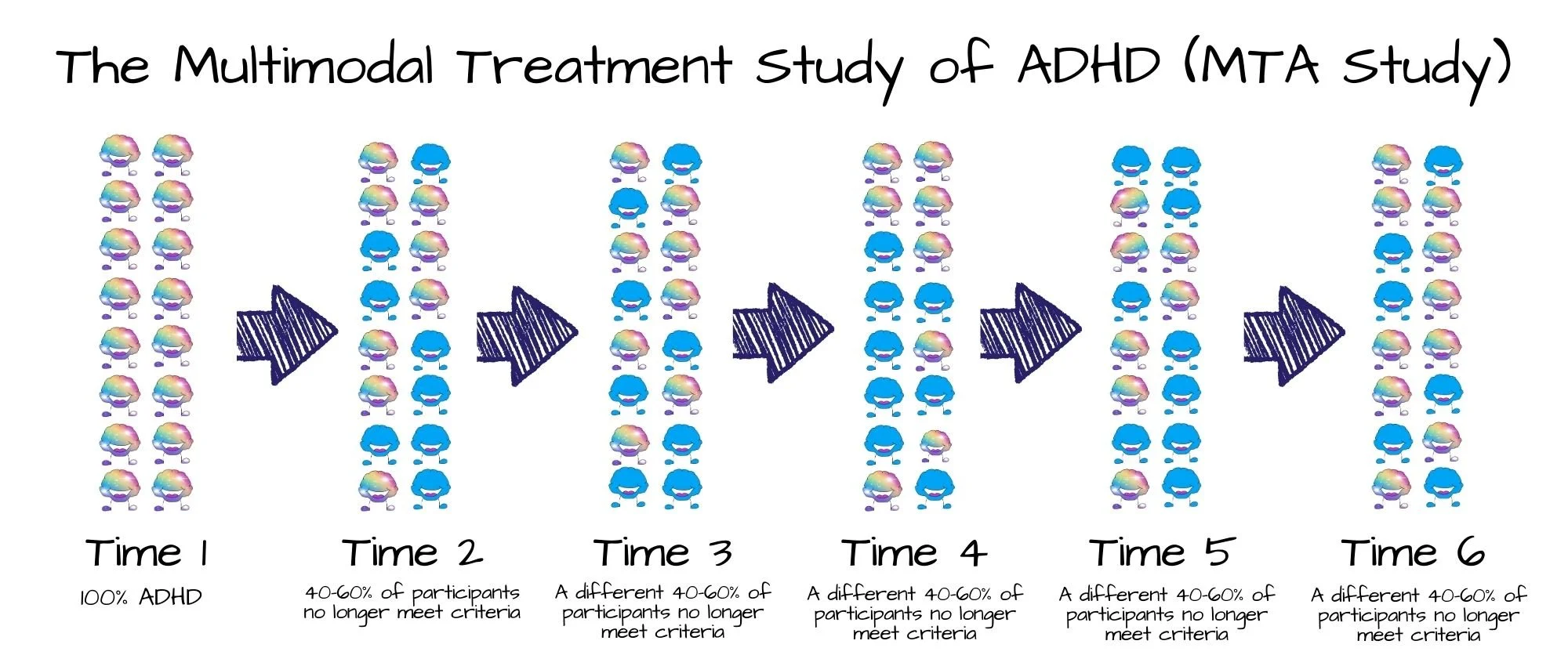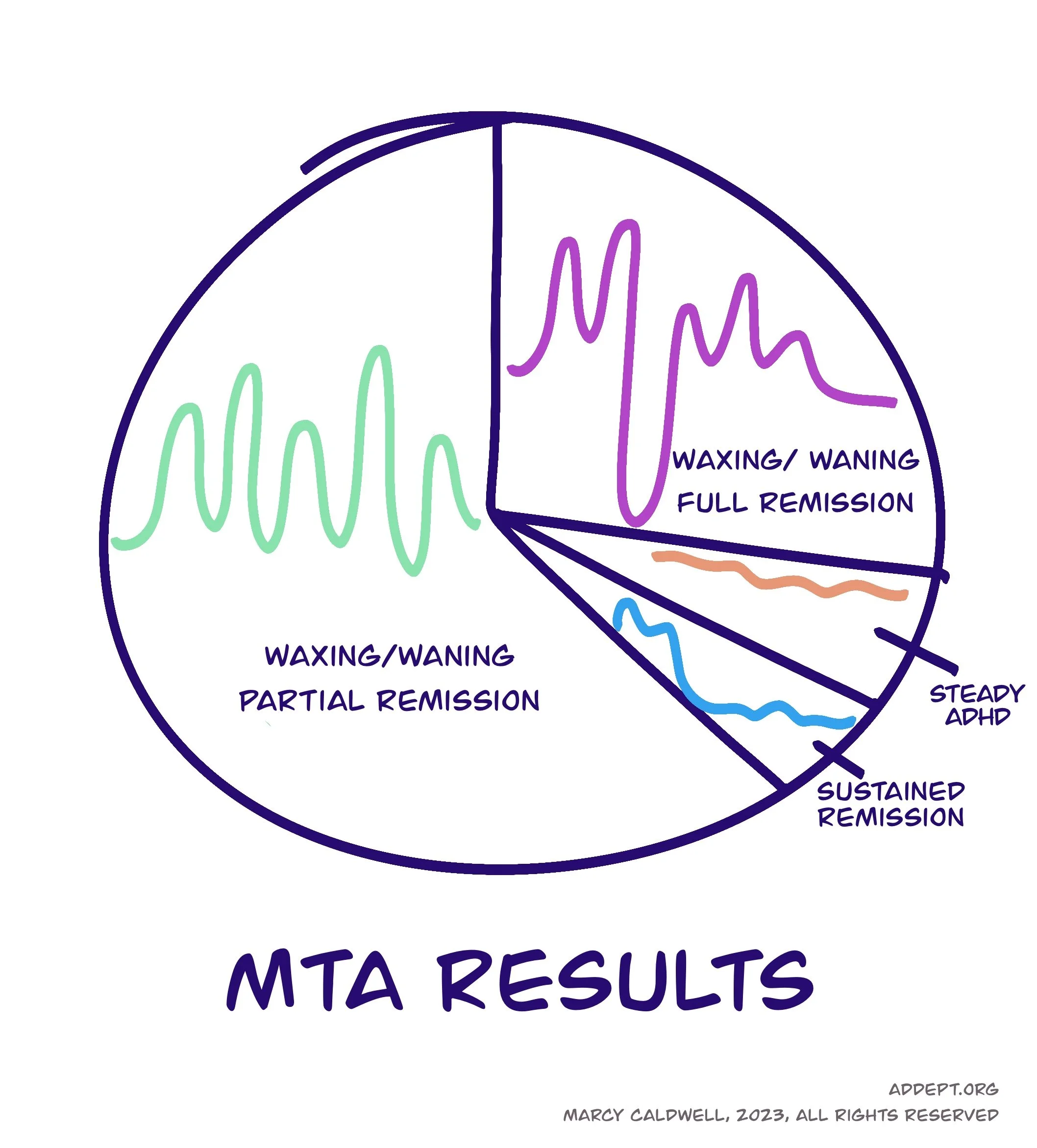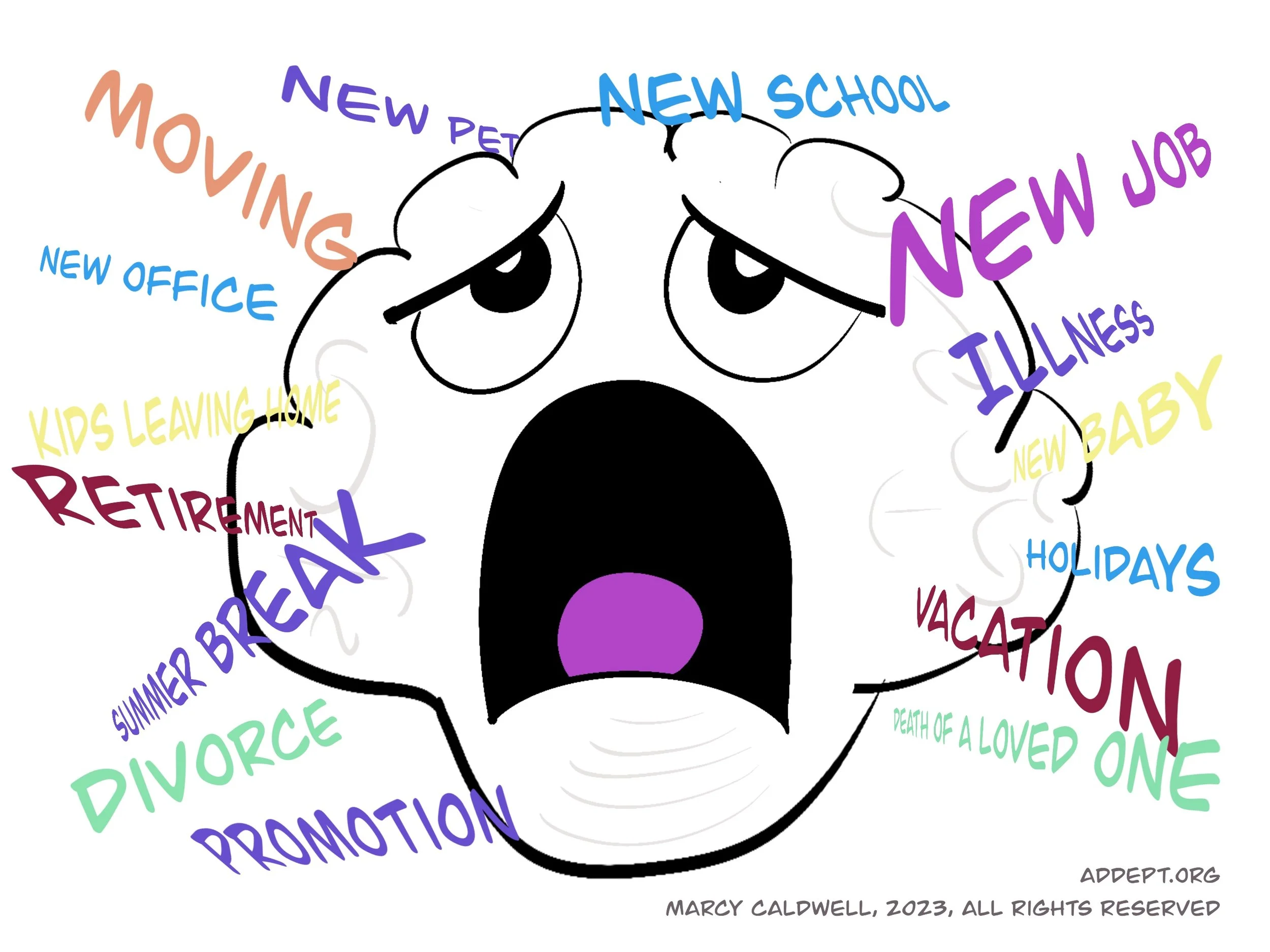Can You Grow Out of ADHD?
New Science Has Interesting Answers
Living with ADHD is hard enough, but it's made monumentally more nails-on-a-chalkboardingly tormenting when people keep dismissing it as “just a kid thing." It’s like a never-ending confidence-crushing echo that follows us wherever we go, whether it's in the questions we face from others or the self-doubt that swirls around in our own minds.
Well, guess what? There's been some truly groundbreaking research that's taken place lately, and it's shining a whole new light on the subject of adult ADHD. And it has real implications for us all— clinicians, people with ADHD, and the general public alike.
Are you ready? Great! Let’s dive in:
A (brief) history of Adult ADHD:
We used to think that ADHD was like a childhood phase that you outgrew, kind of like those neon slap bracelets from the '90s.
Back in the day, people were so convinced that ADHD only affected kids that the fancy-pants International ADHD Conference straight-up banned any talk of adult ADHD until 2001(1). As if full-grown ADHD Brains were mythical creatures that didn’t warrant discussion.
But, shocker of all shockers (or really, not shocking at all)- it turns out they/we were wrong.
ADHD doesn't just clock out when you hit adulthood. In fact, for a lot of folks, ADHD can actually be more of a challenge as an adult than it was when we were rocking our pigtails and Power Rangers lunchboxes.
In fact, as the years went by, clinicians realized that it's not a one-size-fits-all kinda thing. ADHD can develop and change throughout our whole lives, showing up in different ways at different ages and in different people.
So you can imagine the confusion when research still said that a whopping 40-60% of ADHD brains grow out of their ADHD symptoms completely. Who were these people? And how come we've never met them?
That question had us scratching our heads for decades. It wasn't until the latest Multimodal Treatment Study of ADHD (cue fanfare and confetti) that we finally got some answers that made sense.
Dispelling the Myth: The Multimodal Treatment Study of ADHD (MTA Study)
Here's the deal: all those previous studies that said 40-60% of kids with ADHD grow out of it? They were what we call "single endpoint" studies. Basically, they tested a group of kids once, gave 'em some treatment, and then tested them again.
And so when they found that a chunk of those kiddos no longer had ADHD symptoms, they said- great! They’re cured, ADHD done.
But, the MTA study was the first to really take things to a whole new level. They followed a whopping 558 children with ADHD for a mind-blowing 22 years (and it’s still ongoing!). That's right, multiple tests, multiple data points, and a whole lotta insight into how ADHD evolves over time. With all of that time and data, they got a much more clear image of what was really happening for everyone.
While around 30% of the children experienced full remission of their symptoms at some point during the study, a whopping 60% actually had a comeback of their ADHD after that initial period of remission.
When they looked over time, they saw that only 9.1% of the sample showed long-lasting recovery, meaning they were in the clear, symptom-free zone at every subsequent testing point. 10.8% had consistent ADHD symptoms throughout the entire study. And the rest of 'em?
Well, turns out most of the participants had symptoms that grew and shrank over time, waxing and waning as time passed— about 15.6% rising and falling between partial remission and full ADHD, while another 63.6% hit full remission before bouncing back up to full ADHD at a later time.
This is transformative. It means that we can forget about the idea that half of all kids with ADHD magically grow out of it.
The MTA study paints a very different picture- it suggests that for 90% of the sparkly ADHD brains out there, symptoms tend to stay with us- either playing peek-a-boo or sticking around in a more consistent sort of way.
Predicting ADHD Symptom Flare-Ups:
So, we now know in a hard data sort of way, something ADHD brains have known in a feel-it-in-your-bones-kind-of-way forever: ADHD symptoms are sneaky- relapsing and remitting, popping up when we least expect it. And this popping up can make it all feel kind of magical and hopeless sometimes. Everything can be going along fine, and then suddenly, we’re bowled over by our symptoms.
But the MTA study and other research can help us make sense of this seemingly unpredictable beast- showing that there are a bunch of things that can set off those ADHD vulnerabilities and turn them into full-blown hyperdrive:
Stress
Ah, stress, the arch-nemesis of focus and attention. When stress comes a-knockin', ADHD symptoms can come roaring in like a tornado.
It's like your brain is saying, "Hey, let's make this chaos even more chaotic!" Fun times, right?
Sleep
Oh boy, I think we can all relate to this one. When we don't catch enough zzz's, our ADHD symptoms can go full-on Hulk mode. It's like your brain says, "Who needs focus when you can have a foggy brain, forgetfulness, and hair-trigger emotions?"
Sleep has a huge impact on our ADHD brains. Check out this post for concrete ADHD-friendly strategies for getting more sleep.
Nutrition
What we put into our bodies can have a serious impact on our ADHD symptoms-
Changes in blood sugar can cause our regulatory symptoms to tank or thrive and all the junk food that we love so much? It’s been shown to turn our ADHD symptoms up to the max.
Substance Abuse
One of the base differences in ADHD brains is a difference in the regulation of the reward system. This reward system difference makes ADHD brains much more susceptible to substance abuse.
But the truth is substance abuse and ADHD don't mix well. It's like throwing a lit match onto a gasoline-soaked ADHD fire.
Medication Changes
I’m sure you’ve all noticed this one-
When your doc switches up your meds, it can send your ADHD symptoms on a rollercoaster ride. It's like your brain is saying, "Wait, we've got new rules now!"
Hormone Changes
Women get the added bonus of having the constant flux of hormones that change up the impact of ADHD throughout their months and their lives.
Estrogen and Progesterone are essential components in the whole mix, and so, unsurprisingly, most women notice an increase in ADHD symptoms in the lead-up to their period. They also notice very significant increases in symptoms with perimenopause and menopause as well as with pregnancy.
Life/ Routine/ Environment Changes
Here’s a really big one.
Our ADHD brains thrive on structure and familiarity, so when you throw a curveball in there, things can get a little bonkers- throwing off all of those carefully crafted scaffolds that kept the friction at a minimum.
The Progression of ADHD Cheatsheet:
Okay, so that was a lot of research talk- let's boil this down to the main points:
ADHD is a very real and almost always lifelong neurological difference.
The symptoms and impact of ADHD can wax and wane over time.
Major life disruptions and lifestyle changes can trigger an increase in ADHD symptoms.
What does this all mean for me? Managing ADHD throughout life
ADHD brains are unique, with their own motivational and regulatory structures. And those particular peccadillos will remain throughout our lives.
However, there's something really encouraging that the MTA study (and many others) shows: intervention and treatment can actually help lessen the impact of these symptoms and struggles in our lives. Allowing us to harness the positives while reducing the negatives of that difference.
But, both major and minor life changes can throw our systems and strategies out of balance, making it all flare up again. These are the moments that can create friction between our ADHD brains and the world around us. So, being aware and prepared can make a big difference in how we navigate these challenges.
Now, I'm curious to learn from you. Have you noticed any changes in your ADHD symptoms over the years? When do you find it flares up in your life? We’d love to hear about your experience in the comments below!
-
ADDitude Editors. (2023). Adult ADHD is real. ADDitude magazine. Retrieved October 10, 2023, from https://www.additudemag.com/adult-adhd-is-real/
Sibley MH, Arnold LE, Swanson JM, Hechtman LT, Kennedy TM, Owens E, Molina BSG, Jensen PS, Hinshaw SP, Roy A, Chronis-Tuscano A, Newcorn JH, Rohde LA; MTA Cooperative Group. Variable Patterns of Remission From ADHD in the Multimodal Treatment Study of ADHD. Am J Psychiatry. 2022 Feb;179(2):142-151. doi: 10.1176/appi.ajp.2021.21010032. Epub 2021 Aug 13. PMID: 34384227; PMCID: PMC8810708.
Xu, G., Strathearn, L., Liu, B., Yang, B., & Bao, W. (2018). Twenty-year trends in diagnosed attention-deficit/hyperactivity disorder among US children and adolescents, 1997-2016. JAMA Network Open, 1(4), e181471. doi:10.1001/jamanetworkopen.2018.1471
Ready to shift from
meltdown to mastery?
This online course has been designed specifically to help teach the strategies ADHD brains need to help them move from overwhelm and meltdowns to confident emotional mastery.
Want to know more about
thriving with ADHD?
Check out these other articles:






















How to Create Smart Systems for ADHD Brains (that are totally do-able!)